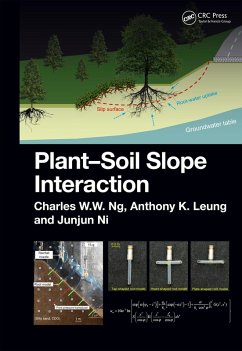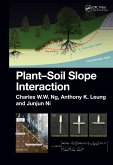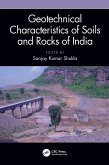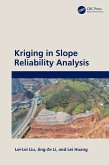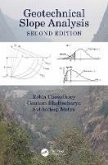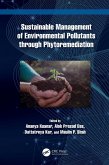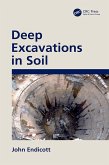46,95 €
46,95 €
inkl. MwSt.
Sofort per Download lieferbar

23 °P sammeln
46,95 €
Als Download kaufen

46,95 €
inkl. MwSt.
Sofort per Download lieferbar

23 °P sammeln
Jetzt verschenken
Alle Infos zum eBook verschenken
46,95 €
inkl. MwSt.
Sofort per Download lieferbar
Alle Infos zum eBook verschenken

23 °P sammeln
- Format: PDF
- Merkliste
- Auf die Merkliste
- Bewerten Bewerten
- Teilen
- Produkt teilen
- Produkterinnerung
- Produkterinnerung

Bitte loggen Sie sich zunächst in Ihr Kundenkonto ein oder registrieren Sie sich bei
bücher.de, um das eBook-Abo tolino select nutzen zu können.
Hier können Sie sich einloggen
Hier können Sie sich einloggen
Sie sind bereits eingeloggt. Klicken Sie auf 2. tolino select Abo, um fortzufahren.

Bitte loggen Sie sich zunächst in Ihr Kundenkonto ein oder registrieren Sie sich bei bücher.de, um das eBook-Abo tolino select nutzen zu können.
This book applies unsaturated soil mechanics, plant science and ecology to the effects of vegetation on the engineering performance of slopes, embankments and landfill, the mechanical effects of root reinforcement, and the hydrological effects of plant transpiration on soil suction and water permeability.
- Geräte: PC
- ohne Kopierschutz
- eBook Hilfe
- Größe: 18.34MB
Andere Kunden interessierten sich auch für
![Plant-Soil Slope Interaction (eBook, ePUB) Plant-Soil Slope Interaction (eBook, ePUB)]() Charles NgPlant-Soil Slope Interaction (eBook, ePUB)46,95 €
Charles NgPlant-Soil Slope Interaction (eBook, ePUB)46,95 €![Geotechnical Characteristics of Soils and Rocks of India (eBook, PDF) Geotechnical Characteristics of Soils and Rocks of India (eBook, PDF)]() Geotechnical Characteristics of Soils and Rocks of India (eBook, PDF)72,95 €
Geotechnical Characteristics of Soils and Rocks of India (eBook, PDF)72,95 €![Fundamentals of Sedimentology (eBook, PDF) Fundamentals of Sedimentology (eBook, PDF)]() Sreepat JainFundamentals of Sedimentology (eBook, PDF)113,95 €
Sreepat JainFundamentals of Sedimentology (eBook, PDF)113,95 €![Kriging in Slope Reliability Analysis (eBook, PDF) Kriging in Slope Reliability Analysis (eBook, PDF)]() Lei-Lei LiuKriging in Slope Reliability Analysis (eBook, PDF)52,95 €
Lei-Lei LiuKriging in Slope Reliability Analysis (eBook, PDF)52,95 €![Geotechnical Slope Analysis (eBook, PDF) Geotechnical Slope Analysis (eBook, PDF)]() Robin ChowdhuryGeotechnical Slope Analysis (eBook, PDF)134,95 €
Robin ChowdhuryGeotechnical Slope Analysis (eBook, PDF)134,95 €![Sustainable Management of Environmental Pollutants through Phytoremediation (eBook, PDF) Sustainable Management of Environmental Pollutants through Phytoremediation (eBook, PDF)]() Sustainable Management of Environmental Pollutants through Phytoremediation (eBook, PDF)88,95 €
Sustainable Management of Environmental Pollutants through Phytoremediation (eBook, PDF)88,95 €![Deep Excavations in Soil (eBook, PDF) Deep Excavations in Soil (eBook, PDF)]() John EndicottDeep Excavations in Soil (eBook, PDF)44,95 €
John EndicottDeep Excavations in Soil (eBook, PDF)44,95 €-
-
-
This book applies unsaturated soil mechanics, plant science and ecology to the effects of vegetation on the engineering performance of slopes, embankments and landfill, the mechanical effects of root reinforcement, and the hydrological effects of plant transpiration on soil suction and water permeability.
Dieser Download kann aus rechtlichen Gründen nur mit Rechnungsadresse in A, B, BG, CY, CZ, D, DK, EW, E, FIN, F, GR, HR, H, IRL, I, LT, L, LR, M, NL, PL, P, R, S, SLO, SK ausgeliefert werden.
Produktdetails
- Produktdetails
- Verlag: Taylor & Francis
- Seitenzahl: 206
- Erscheinungstermin: 1. Juli 2019
- Englisch
- ISBN-13: 9781351052375
- Artikelnr.: 57082113
- Verlag: Taylor & Francis
- Seitenzahl: 206
- Erscheinungstermin: 1. Juli 2019
- Englisch
- ISBN-13: 9781351052375
- Artikelnr.: 57082113
- Herstellerkennzeichnung Die Herstellerinformationen sind derzeit nicht verfügbar.
Professor Charles W. W. Ng, PhD, CEng, FICE, FASCE, FHKIE, FHKEng
Professor Ng is an Associate Vice-President for Research and Development and the CLP Holdings Chair Professor of Sustainability in the Department of Civil and Environmental Engineering at the Hong Kong University of Science and Technology (HKUST). He obtained his PhD degree from the University of Bristol in 1993 and carried out postdoctoral research at the University of Cambridge between 1993 and 1995. He returned to Hong Kong and joined HKUST as an Assistant Professor in 1995, rose through the ranks to become a Chair Professor of civil and structural engineering in 2011 and was conferred the CLP named chair in 2017. Professor Ng was elected as the President of the International Society for Soil Mechanics and Geotechnical Engineering (ISSMGE) in September 2017 for a four-year term.
Professor Ng was also elected as an Overseas Fellow at Churchill College, the University of Cambridge, in 2005 and a Changjiang Scholar (Chair Professor of geotechnical engineering) by the Ministry of Education of China in 2010. He is a Fellow of the Institution of Civil Engineers (FICE), the American Society of Civil Engineers (FASCE), the Hong Kong Institution of Engineers (FHKIE), and the Hong Kong Academy of Engineering Sciences (FHKEng). Currently, he is an Associate Editor of the Canadian Geotechnical Journal, an Editor of Landslides, and an editorial board member of many other international journals.
Professor Ng has published some 300 SCI journal articles and 230 conference papers and delivered more than 50 keynotes and state-of-the-art reports worldwide. He also delivered the 2017 Huangwenxi Lecture (¿¿¿¿¿) on "Atmosphere-plant-soil Interactions: Theories and Mechanisms" organized by the Chinese Journal of Geotechnical Engineering and held at Tsinghua University, Beijing. The Huangwenxi Lecture is the most prestigious named geotechnical lecture in China. He is also the main author of two reference books: (i) Soil-structure Engineering of Deep Foundations, Excavations and Tunnels and (ii) Unsaturated Soil Mechanics and Engineering. He has supervised 46 PhD and 42 MPhil students to graduation since 1995.
Professor Anthony K. Leung, PhD
Professor Leung is an Assistant Professor of geotechnical engineering in the Department of Civil and Environmental Engineering at HKUST. Prior to his appointment at HKUST, he was a Lecturer (2012-2016), and subsequently promoted to a Senior Lecturer (2016-2018), in civil engineering at the University of Dundee, UK. Professor Leung is currently the Associate Director of the Geotechnical Centrifuge Facility at HKUST and the Editor-in-Chief of the Bulletin of the ISSMGE. He is an editorial board member of various major international journals including the Canadian Geotechnical Journal, Landslides and Proceedings of the Institution of Civil Engineers-Geotechnical Engineering. Over the last 10 years, he has published more than 40 SCI journal articles in the field of soil bioengineering and its application to soil slope stabilisation.
Dr Jun-jun Ni, PhD
Dr Jun-jun Ni is a postdoctoral fellow at HKUST. He completed his bachelor's and master's degrees at Hohai University, Nanjing, China, prior to obtaining his PhD degree at HKUST in 2017. His research interests include field monitoring, laboratory testing and numerical modelling of atmosphere-plant-soil interaction and its effects on the engineering performance of soil slopes and landfill covers. Dr Ni has published in prominent journals such as Géotechnique, the Canadian Geotechnical Journal and Computers and Geotechnics.
Professor Ng is an Associate Vice-President for Research and Development and the CLP Holdings Chair Professor of Sustainability in the Department of Civil and Environmental Engineering at the Hong Kong University of Science and Technology (HKUST). He obtained his PhD degree from the University of Bristol in 1993 and carried out postdoctoral research at the University of Cambridge between 1993 and 1995. He returned to Hong Kong and joined HKUST as an Assistant Professor in 1995, rose through the ranks to become a Chair Professor of civil and structural engineering in 2011 and was conferred the CLP named chair in 2017. Professor Ng was elected as the President of the International Society for Soil Mechanics and Geotechnical Engineering (ISSMGE) in September 2017 for a four-year term.
Professor Ng was also elected as an Overseas Fellow at Churchill College, the University of Cambridge, in 2005 and a Changjiang Scholar (Chair Professor of geotechnical engineering) by the Ministry of Education of China in 2010. He is a Fellow of the Institution of Civil Engineers (FICE), the American Society of Civil Engineers (FASCE), the Hong Kong Institution of Engineers (FHKIE), and the Hong Kong Academy of Engineering Sciences (FHKEng). Currently, he is an Associate Editor of the Canadian Geotechnical Journal, an Editor of Landslides, and an editorial board member of many other international journals.
Professor Ng has published some 300 SCI journal articles and 230 conference papers and delivered more than 50 keynotes and state-of-the-art reports worldwide. He also delivered the 2017 Huangwenxi Lecture (¿¿¿¿¿) on "Atmosphere-plant-soil Interactions: Theories and Mechanisms" organized by the Chinese Journal of Geotechnical Engineering and held at Tsinghua University, Beijing. The Huangwenxi Lecture is the most prestigious named geotechnical lecture in China. He is also the main author of two reference books: (i) Soil-structure Engineering of Deep Foundations, Excavations and Tunnels and (ii) Unsaturated Soil Mechanics and Engineering. He has supervised 46 PhD and 42 MPhil students to graduation since 1995.
Professor Anthony K. Leung, PhD
Professor Leung is an Assistant Professor of geotechnical engineering in the Department of Civil and Environmental Engineering at HKUST. Prior to his appointment at HKUST, he was a Lecturer (2012-2016), and subsequently promoted to a Senior Lecturer (2016-2018), in civil engineering at the University of Dundee, UK. Professor Leung is currently the Associate Director of the Geotechnical Centrifuge Facility at HKUST and the Editor-in-Chief of the Bulletin of the ISSMGE. He is an editorial board member of various major international journals including the Canadian Geotechnical Journal, Landslides and Proceedings of the Institution of Civil Engineers-Geotechnical Engineering. Over the last 10 years, he has published more than 40 SCI journal articles in the field of soil bioengineering and its application to soil slope stabilisation.
Dr Jun-jun Ni, PhD
Dr Jun-jun Ni is a postdoctoral fellow at HKUST. He completed his bachelor's and master's degrees at Hohai University, Nanjing, China, prior to obtaining his PhD degree at HKUST in 2017. His research interests include field monitoring, laboratory testing and numerical modelling of atmosphere-plant-soil interaction and its effects on the engineering performance of soil slopes and landfill covers. Dr Ni has published in prominent journals such as Géotechnique, the Canadian Geotechnical Journal and Computers and Geotechnics.
Introduction. Hydrological effects of plant on matric suction. Mechanical
effects of plant root reinforcement. Field studies of plant transpiration
effects on ground. Theoretical modelling of plant hydrological effects on
matric suction and slope stability. Effects of plant on slope hydrology,
stability and failure mechanisms: geotechnical centrifuge modelling.
References.
effects of plant root reinforcement. Field studies of plant transpiration
effects on ground. Theoretical modelling of plant hydrological effects on
matric suction and slope stability. Effects of plant on slope hydrology,
stability and failure mechanisms: geotechnical centrifuge modelling.
References.
Introduction. Hydrological effects of plant on matric suction. Mechanical
effects of plant root reinforcement. Field studies of plant transpiration
effects on ground. Theoretical modelling of plant hydrological effects on
matric suction and slope stability. Effects of plant on slope hydrology,
stability and failure mechanisms: geotechnical centrifuge modelling.
References.
effects of plant root reinforcement. Field studies of plant transpiration
effects on ground. Theoretical modelling of plant hydrological effects on
matric suction and slope stability. Effects of plant on slope hydrology,
stability and failure mechanisms: geotechnical centrifuge modelling.
References.
